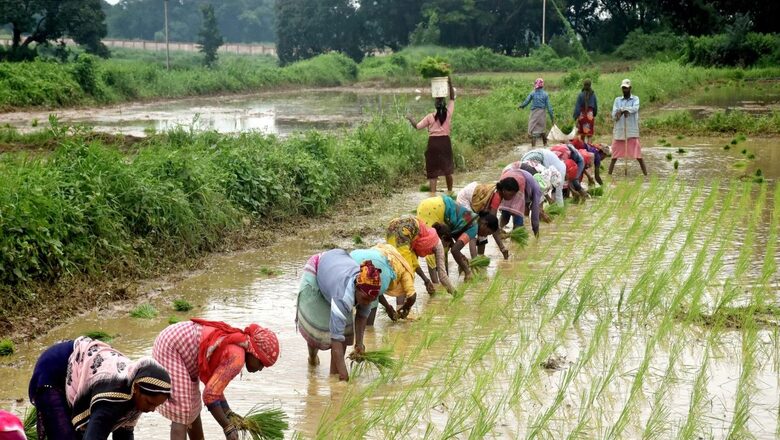
views
Soil and water are two fundamental resources for our sustenance with over 95 per cent of our food originating from them. The symbiotic connection between soil and water is the foundation of our agricultural systems and critical to achieving the United Nations Agenda 2030. However, the current climatic changes coupled with human activities are adding excessive pressure on our soil and water.
For India, the criticality of good soil health and water availability is imminent as around 50 per cent of the country’s net sown area is rainfed, contributing to 40 per cent of the total food production. On World Soil Day 2023 (WSD), the Food and Agriculture Organisation (FAO) of the United Nations, with the theme ‘Soil and water, a source of life’ called upon the need to raise awareness on the importance and relationship between soil and water in achieving sustainable and resilient agrifood systems. It advocates the essentiality of working with individuals to empower and engage to improve soil health.
Soil Health in India
Agriculture in India faces numerous challenges in managing soils. Most soils across the country are characterised by low nutrient levels, with the average soil organic carbon (SOC) being around 0.54 per cent. India also confronts challenges stemming from land degradation and the deterioration of soil health. With about 30 per cent of the total geographical area under the process of land degradation, the deficiency of several plant nutrients adversely affects the nutrition intake among the local population.
Nutrient depletions and deficiencies in soil, coupled with inappropriate fertiliser application, lead to declining productivity. Adequate replenishment of nutrients, appropriate fertiliser applications tailored to soil types and increasing organic contents in soil are some of the practices essential for ensuring sustainable food production. It is also noteworthy that in India, an estimated 3 billion tonnes of soil is carried away by water and wind, annually.
Degraded soil and water resources affect food security
Food availability depends on soils. Nutritious and good-quality food and animal fodder can only be produced if our soils are healthy. Soils supply nutrients and water to crops through their root systems, which in turn produce our food. They also create an environment for millions of micro-organisms and support soil biodiversity.
The interconnectedness of soil and water for food security is vital for ensuring food and nutrition security. Inappropriate soil and water management practices can lead to soil erosion, reduced soil biodiversity, diminished soil fertility, and compromised water quality and availability. Water scarcity, on the other hand, leads to the loss of soil biodiversity and causes eutrophication, resulting in the loss of biodiversity in water bodies.
Inappropriate use of pesticides and fertilisers not only threatens soil and water quality but also poses significant risks to human health and ecosystems. Additionally, an increase in soil salinisation and sodification, resulting from poor management of irrigation and drainage, as well as rising sea levels, negatively impacts agricultural productivity.
Need for an integrated soil and water management approach
Sustainable soil management could produce more food. Land use planning and sustainable management of soils require innovative approaches and the involvement of multiple stakeholders. FAO supports the Government of India’s efforts in soil and water management, as an essential step towards promoting climate-resilient agri-food systems in India. Currently, FAO is working alongside the National Rainfed Area Authority of the Ministry of Agriculture and Farmers’ Welfare (MoA&FW) and is in the process of developing predictive tools through data analytics which will be piloted in Andhra Pradesh, Himachal Pradesh, Karnataka, and Maharashtra. These tools support at-risk farmers, especially in rainfed regions, by providing them with valuable insights for informed decision-making regarding crop selection.
FAO advocates the Government of India’s five-pronged strategy for soil conservation which includes making soil chemical-free, saving soil biodiversity, enhancing soil organic matter, maintaining soil moisture, mitigating soil degradation, and preventing soil erosion. The Indian government’s Soil Health Card scheme, launched in 2015, displays soil health indicators and associated descriptive terms, which guide farmers to make necessary soil amendments.
FAO has developed a tool RECSOIL, a mechanism for scaling up sustainable soil management with a focus on soil organic carbon. In India, FAO promotes crop diversification and conducts landscape planning across Madhya Pradesh, Mizoram, Odisha, Rajasthan, Uttarakhand, Chhattisgarh, Haryana, and Punjab. In Andhra Pradesh, FAO collaborates with the state government and the Indian Council of Agricultural Research (ICAR) to aid farmers in transitioning sustainably towards agro-ecological methods and organic farming.
FAO believes that integrated sustainable soil and water management practices, such as minimum tillage, crop rotation, organic matter addition, and cover cropping, are essential to improving soil health, reducing erosion, and enhancing water infiltration and storage. These practices help preserve soil biodiversity, improve fertility, and contribute to carbon sequestration. They play a crucial role in reducing climate change impacts and enhancing food and nutrient security.
Takayuki Hagiwara is FAO Representative in India. Views expressed in the above piece are personal and solely those of the author. They do not necessarily reflect News18’s views.



















Comments
0 comment